"The Matrix" Is Not What You Think - Here’s Why It Matters
How Your Perception of Reality Has Been Engineered - And What You Can Do About It
Ever notice that strange feeling - that vague suspicion that something fundamental about reality isn't quite right?
It's not paranoia. It's recognition.
Stop reading for a moment.
Look around you. What do you actually see? Not what you think is there. Not what you've been told is there. Just what your senses are directly experiencing right now.
Now consider everything else beyond your immediate perception - the city outside your walls, the countries across oceans, historical events, scientific facts, political realities. All of this exists in your mind as information, not direct experience.
This is not merely an interesting philosophical observation. It is the central vulnerability through which your autonomy, your agency, and your very consciousness are being systematically compromised. Your perception - and therefore your thoughts, beliefs, decisions, and actions - are being shaped by forces that understand the architecture of understanding better than you do.
What's at stake is not just what you believe, but your ability to determine what is believable. Not just what you think, but your capacity to think independently at all.
The Consensus Reality Machine
Have you ever noticed how certain topics instantly transform reasonable, intelligent people into rabid fucking defenders of "obvious truth"? How questioning certain narratives - even with well-sourced information - can get you labeled as crazy, dangerous, or a "conspiracy theorist"?
That visceral reaction isn't defending facts. It's defending consensus reality.
Consensus reality is the unwritten agreement about what is real, what is possible, what is reasonable to discuss, and what must never be questioned. It's not just about specific facts but about the boundaries of acceptable thought itself.
Many of us hold nearly identical views on fundamental questions about how our world works, despite having experienced almost none of these things firsthand.
This isn't natural. It's constructed.
Humans throughout most of history had mental models limited primarily to what they directly experienced or learned from their immediate community. Their "world" was relatively small. But today? Your mental model encompasses the entire globe, reaches back thousands of years, and extends into microscopic and cosmic realms invisible to human perception.
All of this exists in your mind as information, not experience.
What's fascinating is how this shared mental model is maintained and enforced. Question some minor aspect of consensus reality, and you might be tolerated. Question fundamental aspects, and watch how quickly social mechanisms activate to correct or isolate you.
These enforcement mechanisms aren't necessarily conscious or coordinated. They're embedded in our culture, our language, our social norms. We all enforce consensus reality on each other without realizing it.
Who Benefits From Your Reality?
Make no mistake - our shared mental model of "the world" isn't politically neutral or objectively determined. It contains specific assumptions about power, economics, history, and human nature that serve some interests far better than others.
Consider how our consensus reality handles these fundamental questions:
Who deserves wealth and who deserves poverty?
Which forms of violence are legitimate and which are criminal?
Whose suffering matters and whose can be ignored?
What resources can be owned and by whom?
Which questions are reasonable to ask and which are dangerous?
The answers embedded in our consensus reality feel "natural" and "obvious" to most people. But they represent just one possible configuration of human understanding - a configuration that happens to maintain existing power structures remarkably well.
Look at how our mental model of "the world" has evolved over time. Not through neutral, objective discovery, but through active construction by those with the power to shape narrative. From religious institutions to governments to modern media conglomerates and tech platforms - those who control information flow have always shaped consensus reality.
The point isn't that everything you've been told is false. That would be replacing one dogma with another. The point is that consensus reality is constructed rather than discovered, maintained through social and institutional forces rather than through its inherent truthfulness.
And if reality itself - or at least our shared understanding of it - is constructed rather than objective, that raises profound questions about who is doing the constructing, and for what purpose.
The Information Matrix We Live In
What if I told you that your entire understanding of reality is actually a sophisticated information construct? Not just influenced by information, but fundamentally built from it, piece by piece, throughout your life?
Think about this carefully. Everything you "know" beyond your immediate perceptions exists in your mind as a complex model. This model wasn't discovered - it was built. Installed. Downloaded.
Right now you have a mental model of everything - from how atoms work to what happened in ancient Rome to what's happening right now in countries you'll never visit. This vast web of "knowledge" forms your reality tunnel. It dictates what you believe is possible, what deserves your attention, and what questions you're allowed to ask.
And this construct, this information field that we mistake for objective reality itself, has a name that many reference but few truly understand:
The Matrix.
It's not the physical world itself - it's the interpretation of that world constructed in your mind. The filter through which you perceive everything. The narrative that gives meaning to raw experience.
Am I saying nothing is real? No. I'm saying that the world you THINK you live in exists primarily as a mental construct. Your IDEA about reality has been shaped by forces outside your control, absorbed so gradually that you mistake it for reality itself.
In the “The Matrix” movie, Morpheus tells Neo, "No one can be told what the Matrix is, you have to see it for yourself." But I've found the opposite to be true.
The Matrix - this information field that shapes perception - is actually quite simple to explain. It's the constructed information field we mistake for objective truth.
What's A LOT harder to merely explain is what lies beyond it - reality unfiltered by these constructed narratives. So the statement is more correct as:
No one can be told what reality is, you have to see it for yourself.
The point is, what people call "The Matrix" (although most people have no idea what it really means) really is the world we THINK we live in. It's a field of information in our minds that shape how we perceive reality.
If you can control perception, you can control reality itself.
Wake up, Neo.
The Matrix has you.
The Information Bubble:
What Do You Actually Know?
Let's start with a question that sounds simple but isn't: What do you actually know?
Not what you think you know. Not what you've been told. What do you know with absolute certainty, based on your direct experience?
If you're honest with yourself, this list is shockingly short.
You know you exist in some form. You are a growing, seemingly fleshy being in a world full of other, seemingly fleshy beings. You know what you can directly perceive in this moment. Perhaps you know some basic facts about your immediate life, close relations and surroundings.
Everything else - and I mean everything - comes to you secondhand.
Think about it.
Your understanding of history? Secondhand information, filtered through textbooks, documentaries, and teachers who received their information the same way.
Your knowledge of how the economy actually works? Secondhand.
Your beliefs about what's happening in other countries? Secondhand.
Even your understanding of your own country beyond your immediate community? Largely secondhand.
We've been conditioned to see this massive database of secondhand information as "knowledge” or even as “truth.”
Examining the Information Pipeline
This wouldn't be particularly troubling if the information pipeline feeding us were neutral, objective, and transparent. But is it?
Consider your news sources. Who owns them? What are their incentives? What stories do they amplify, and which do they ignore? What perspectives do they present as reasonable, and which do they frame as fringe or dangerous?
Consider your education. Who designed the curriculum? What version of history were you taught? What questions were encouraged, and which were subtly discouraged?
Consider your social media feeds. What algorithms determine what you see? What content is promoted and what is suppressed? Who benefits from your attention being directed in specific ways?
The unsettling reality: virtually all information reaching you has been filtered, curated, and often manipulated before arriving in your consciousness. Yet we all walk around acting as if we have direct access to objective reality, when we're actually operating within information bubbles constructed for us, not by us.
This raises a radical question:
How can we trust that history, events, or anything we're told about the world is true?
What if it all has been constructed to specifically keep us from truth? This isn't paranoia - it's the inevitable question that arises when you realize how little you can verify directly.
"But wait," you might say, "I'm a critical thinker. I consider multiple sources. I question what I'm told."
Of course I’m not talking about you, I’m talking about all the other gullible people not nearly as competent at differentiating truth from falsehood as you are.
But even critical thinking operates within the boundaries of what information is available to you in the first place. You can only critically evaluate options you know exist. You can only question narratives you can perceive.
What about the information that never reaches you? The perspectives that are systematically excluded from your information environment? The questions that never occur to you because the very framework of your thinking has been shaped to avoid them?
The Architect's Playbook:
When History Itself Becomes Malleable
Now consider the implications of everything we've established. If virtually all your knowledge is secondhand, if your perception is filtered through frameworks you didn't design, if consensus reality is constructed rather than discovered - what becomes possible for those who understand these mechanisms?
Let's consider this from a different angle. If you were an entity - or group of entities - seeking to control the world, what would be your most effective strategy?
You wouldn't start with physical domination. That's expensive, messy, and generates resistance. No, you'd begin by controlling the information environment that shapes how people perceive reality itself.
Imagine what becomes possible once you understand that virtually all human knowledge exists only as information and are filtered through systems you don't control.
Not just current events. Not just recent history.
Everything.
If you were architecting a system of control, you wouldn't start with crude censorship. You'd begin with something far more sophisticated: the gradual, multi-generational construction of an entire worldview.
Religion served this purpose admirably for millennia and still do to some extent. Different doctrines for different regions, but all engineered toward the same purpose: compliance, limitation, and controlled perception.
As technology evolved, so would your methods. From manuscripts to printing presses, newspapers to radio, television to internet - each technological leap allowing you to transform reality into your version of reality more rapidly, more effectively.
You'd discover something fascinating along the way: historical facts are remarkably easy to fabricate and extraordinarily difficult to verify.
The Library of Alexandria burns, and with it, millions upon millions of perspectives on reality, humanity, consciousness, society and history.
Versions of history that don't serve your narrative.
Documents contradicting your preferred story mysteriously disappear from archives. Counter-narratives are systematically ridiculed and suppressed.
Eventually, you realize the ultimate power: you can literally rewrite the entire history of earth and humanity in ways that serve your interests.
First, consider the simplest form: controlling contemporary narratives. This is what most "media skeptics" focus on - current events being spun to serve particular interests. This level of manipulation is almost trivial, child’s play in the grand design.
The second level runs deeper: controlling recent history. Events within living memory can be reframed, contexts shifted, key details emphasized or buried. Witnesses age and die. Documents get classified or "lost." Within a generation, what was experienced becomes what was reported.
But the true mastery - the third level - lies in controlling deep history itself. The foundation stories that shape civilizations. The wars that "had to be fought." The villains who "had to be stopped." The economic systems that "naturally evolved." The social structures presented as "the way things have always been."
What if - and here's where the vertigo begins - what if the historical narratives you've accepted as foundational truth are themselves sophisticated fabrications?
Not misinterpretations or biased accounts. Complete inversions of reality.
What if history's greatest villains were actually those who opposed the system being constructed around us? What if history's celebrated heroes were those who advanced this system? What if the framework through which you interpret human civilization was designed specifically to prevent you from recognizing its true nature?
Victors don't just write history in a superficial sense. They create the entire interpretive framework through which all subsequent events are understood.
Consider how this would work in practice. Over centuries, you wouldn't just control information - you'd control the meaning assigned to information. You'd establish educational systems that don't just transmit facts but install entire perceptual frameworks. You'd ensure that questioning certain foundational narratives triggers immediate social penalties. You'd make the boundaries of acceptable thought appear natural rather than constructed.
And most brilliantly, you'd allow "free speech" within these boundaries while systematically ridiculing anything outside them.
The educational system becomes your most powerful tool - not teaching students to think, but training them to repeat. "Regurgitate exactly what we've programmed you to believe is true, or face systematic shame, academic failure, and shitty life prospects." Parents, also products of this system, enforce it at home: "Why can't you just study harder? (read: accept the programming)"
Generation by generation, the walls of the perceptual prison are built higher, its foundations sunk deeper.
War serves as the ultimate enforcer of narrative. When manipulation of perception fails, you simply commit whatever atrocities necessary to crush resistance - then rewrite them as the aggressors, the madmen, the dangerous ideologues who "had to be stopped." Within a generation, people will voluntarily spit on the graves of those who tried to free them.
Could it be that the heroes and villains of history have been systematically inverted? That the "madmen" and "tyrants" we've been taught to despise were actually those who recognized and resisted this system of control? That the "great leaders" we've been taught to revere were those who advanced it most effectively?
I'm not claiming to know exactly which specific historical narratives might be inverted. That's the evil genius of the system - once information is controlled systematically enough for long enough, the truth becomes practically unretrievable.
Just try questioning certain historical events, and watch how quickly you're attacked - not with counter-evidence, but with social punishment.
The evidence against the official narrative has been so thoroughly eradicated that even suggesting alternatives sounds absurd within the constructed framework.
But not always. Sometimes artifacts of history slips through - and tell a completely different story to the one we all have taken for granted.
This isn't about adopting some alternative theory. It's about recognizing that once you understand the mechanisms of perception control, you realize nothing - absolutely nothing - in our received understanding of history can be taken at face value.
Am I crazy here? Or are you also seeing that once you recognize how the Information Matrix works, you have to at least consider the possibility that the manipulation goes all the way down to the foundation of what you've been taught about human civilization itself?
The truth isn't just being hidden. It might have been systematically inverted.
The question isn't whether such a system exists. The question is: what would look different if it did?
And if you're feeling that pit in your stomach right now, that vertigo of "holy shit, what if...?" - that's your mind encountering the edges of your programmed reality tunnel. That feeling isn't confusion. It's the beginning of clarity.
Perceptual Sovereignty:
The Freedom They Don't Want You to Discover
Let's name what's truly at stake here: your Perceptual Sovereignty.
The ultimate prison isn't built with walls, but with assumptions so fundamental you never think to question them - and the most effective chains aren't forged from iron, but from the beliefs you'd defend to the death without ever having examined them.
Perceptual Sovereignty is your fundamental right and capacity to determine how your consciousness processes information - to decide what deserves your attention, how you interpret experiences, and what meaning you assign to the world around you.
This sovereignty isn't granted by governments or platforms. It's your inherent capacity as a conscious being. Yet it's systematically undermined by information systems designed to bypass your conscious filters and install prefabricated perceptual frameworks.
True freedom begins with recognizing that your perception belongs to you. Not to algorithms, not to media conglomerates, not to ideologies or institutions. The ability to consciously direct your attention and interpretation is the foundation of all other forms of autonomy.
Without Perceptual Sovereignty, even apparent freedoms become illusions. What use is free speech in a mind whose thoughts are externally structured? What value is the right to vote when your understanding of issues is engineered? What meaning does choice have when your desires themselves are manufactured?
This isn't abstract philosophy. It's the most practical reality of living in the 21st century.
The Attention Economy: The Game Behind The Game
Your attention isn't just valuable - it's the primary battlefield where power is now established and maintained.
The average person spends over 11 hours each day consuming media. That's nearly 70% of waking life with your mind plugged directly into an information stream someone else controls. This isn't accidental. It's by design.
The brilliance of this system is how it keeps us perpetually distracted. We're so bombarded with immediate concerns, controversies, and crises that we never step back to examine the game itself. We debate the content of our information feeds without questioning who controls those feeds and to what end.
This is the game behind the game.
What makes this system so effective is its fracturing of consciousness. Your attention is deliberately kept scattered, jumping from crisis to outrage to distraction. This fragmentation serves a purpose: a mind that's constantly shifting focus can't maintain the sustained attention needed to perceive deeper patterns.
Notice how the cycle works. Something captures collective attention - a scandal, a tragedy, a threat. For a brief moment, millions of minds focus on the same thing. Then, just as people might begin connecting dots or asking deeper questions, another crisis emerges. The spotlight shifts. The cycle repeats.
The most dangerous questions - the ones that might reveal the true nature of power - rarely receive sustained attention. They're either never raised, quickly forgotten, or buried under an avalanche of trivial information.
Meanwhile, manufactured controversies keep us fighting amongst ourselves. The famous divide-and-conquer strategy hasn't disappeared - it's been perfected. While we battle each other over carefully framed political and cultural issues, the fundamental power structures remain untouched and unexamined.
Becoming LUCID: Seeing Through the Matrix
When information comes your way, run it through this strategic assessment:
L - LINEAGE:
Who originated this information and what's their incentive structure?U -UNIFORMITY:
Is the same messaging appearing simultaneously across different platforms?C - COMPLEXITY:
Does it reduce a complex issue to an oversimplified binary?I - IMMUNITY:
Does it attempt to shield itself from questioning through moral accusations?D - DIRECTION:
What action, emotion or belief is it attempting to generate in you?
This isn't just an intellectual exercise. It's cognitive self-defense in an environment designed to bypass your critical thinking.
But the LUCID framework is just the beginning. The deeper practice involves questioning not just specific information but the entire frameworks through which you process all information.
Breaking the Spell: The Art of Questioning Everything
Your path forward requires something simple, yet so profound: learning to question everything, especially the things you believe most strongly.
And I mean everything. Not just the official narratives you may already doubt, but even the alternative explanations you've embraced. Question your political framework, your spiritual beliefs, your understanding of science, your interpretation of history. Question even the tools you use to question. This isn't about replacing mainstream delusions with alternative ones - it's about examining the very foundations of how you construct reality.
This isn't about becoming a cynical skeptic or rejecting all information. It's about developing a fundamentally different relationship with knowledge - one based on conscious discernment rather than passive acceptance.
Step 1: Recognize Your Automatic Beliefs
Throughout your day, catch yourself making assumptions about reality. "This is how the economy works." "This is what happened in history." "This is what's possible or impossible." Don't reject these beliefs - just notice them. See how many unexamined assumptions form the foundation of your worldview.
Step 2: Trace the Origins of Your Beliefs
For each significant assumption, ask: How do I know this? Where did this information come from? Who taught me this was true? What evidence have I personally verified? You'll discover that many of your most confident beliefs rest on surprisingly shaky foundations.
Step 3: Shift from Binary to Probabilistic Thinking
Stop categorizing secondhand information as "true" or "false." Instead, assign probabilities that can shift as new evidence emerges. "Highly likely" or "possible" is more honest than "true." This approach acknowledges the inherent limitations of secondhand knowledge and allow you to hold multiple possibilities at the same time while still allowing functional navigation of reality.
Step 4: Develop Sustained Attention
The system depends on your distraction. It needs you continuously jumping from one piece of information to the next without deeply examining any of it. Resist this fragmentation. Choose topics that matter and explore them deeply rather than broadly. Follow threads to their origins instead of being pulled along by the current of breaking news and viral content.
Step 5: Prioritize Direct Experience
Whenever possible, verify through your own observation rather than accepting secondhand accounts. This doesn't mean personally investigating everything - that's impossible. But it does mean recognizing the fundamental difference between what you've directly experienced and what you've merely been told and using that as the foundation. For everything else - which is most of what you'll encounter - maintain flexible probabilistic thinking.
Step 6: Embrace Not Knowing
The system exploits our discomfort with uncertainty, our desperate need for clear answers and tidy explanations. It offers simple narratives for complex phenomena and encourages snap judgments over patient investigation. Resisting this means developing tolerance for ambiguity. It means holding multiple possibilities in mind simultaneously. It means recognizing that confident declarations about reality often mask profound ignorance rather than indicating genuine understanding.
This is why questioning is so threatening to power systems. Not because it challenges any particular belief, but because it threatens the entire framework through which beliefs are formed and maintained. It reveals the constructed nature of what passes for reality, and in doing so, opens the door to possibilities that exist beyond the Information Matrix.
The Walls of the Room: What's Really Outside?
Let's return to our first experiment. Stop and look around you right now.
If you're indoors, consider that your entire known world exists within the boundaries of the walls that surround you. The probability that the world outside is exactly as you previously left it is quite high - yet, you don't know for sure. Perhaps everything has changed while you were focused elsewhere.
Everything beyond your immediate perception exists for you only as information, as mental images constructed from data you've collected or been provided.
Basically as ideas or assumptions.
It's like you're in a reverse "Schrödinger's Cat" experiment. You know, the thought experiment where they put a cat in a box with a jar of poison that might or might not break. If it breaks, it will kill the cat - if it doesn’t the cat will be alive. But you will not know which it is until you actually open the box and look. Until then, the cat exists in multiple states - both dead and alive at the same time. Mind-fucking, i know.
Similarly, the world outside your immediate perception exists in multiple potential states, until you actually walk outside and directly observe it.
Yet most of us never question whether the world we "know" exists in the form we've been told.
This isn't just philosophical wordplay. It's a practical reality with profound implications.
As you begin recognizing these patterns, you might experience a disturbing sensation - the feeling that the world extends far beyond the model of it you've been given. That there are realities just outside your field of vision that would transform your understanding if you could perceive them.
This isn't paranoia. It's an appropriate response to recognizing the limitations of an information system optimized for control rather than truth.
Consider this possibility: What if human potential - your potential - is vastly greater than what the current consensus reality suggests? What if capabilities considered impossible or even magical within our current framework are actually attainable but systematically obscured?
Throughout history, dominant systems have always defined the boundaries of the possible in ways that maintained their control. The current information ecosystem is no different. By controlling not just specific facts but the very framework through which we interpret experience, it constrains what we believe ourselves to be capable of - individually and collectively.
This constraint serves specific interests. A population that believes meaningful change is impossible won't attempt it. People convinced of their own limitations won't exceed them. Minds that accept the current arrangement as inevitable or optimal won't imagine alternatives.
But these constraints exist primarily in our minds - in the models of reality we've accepted. They're maintained through the continuous flow of information that reinforces certain possibilities while excluding others.
What might become possible if you began questioning these fundamental assumptions? Not just about political or economic arrangements, but about human capacity itself? About what's possible for consciousness, for society, for our collective future?
A man asked a gardener why his plants grew so beautifully. The gardener said, "I don't force them to grow. I remove what stops them."
The world outside your room may be very different from what you've been led to believe. Not just in its details, but in its fundamental nature. The only way to discover this is to step outside the information bubble, to seek direct experience where possible, and to develop the capacity to see beyond the frameworks you've been given.
The Great Awakening:
What Becomes Possible Now?
Breaking free from the Information Matrix isn't about finding some "ultimate truth" hiding behind illusion. It's about recognizing that your perception has been deliberately constrained, and beginning the patient work of expanding beyond those limitations.
The crises we face - environmental collapse, inequality, alienation - aren't random misfortunes. They're predictable outcomes of a particular way of perceiving reality that's been carefully cultivated to benefit some at the expense of many.
But we're witnessing a great awakening that no amount of distraction or manipulation can fully contain. More and more people are asking the fundamental questions: What is real? What is possible? What matters? Who benefits from the current arrangement? What alternatives exist?
These questions threaten the very foundation of the Information Matrix because they reveal its contingent nature. They expose the fact that what we believe to be "reality" is largely a set of information constructs and agreements - agreements we can choose to change when they no longer serve our collective wellbeing.
The power of the question is that it creates space where previously there was only certainty. And in that space, new possibilities emerge. New ways of organizing our lives and societies. New understandings of human potential. New relationships with each other and the living world.
What awaits beyond the Information Matrix isn't another pre-fabricated reality. It's something way more profound: the opportunity to participate consciously in reality's unfolding rather than unconsciously consuming its representation.
But it only begins with your willingness to question everything, especially the things you most take for granted.
See the Game, Change the Game
“The Matrix” isn't a philosophical concept. It's the operating system currently running on human consciousness.
Understanding it isn't about becoming paranoid – it's about becoming free. When you see how the game board is arranged and recognize the plays being made, you're no longer just a piece being moved around. You become a player.
This is just the beginning of mapping the territory. In coming pieces, we'll explore how this same control system operates, and have been operating in more detail – all converging toward what I've previously called "The Triumph of Technocracy."
The stakes couldn't be higher. What's being determined right now isn't just what you believe, but your capacity to determine what's believable at all. Your Perceptual Sovereignty isn't just under influence – it's completely hijacked.
As you progress in reclaiming your Perceptual Sovereignty, you'll discover something extraordinary: the world is vastly more interesting, more alive, more fluid and more responsive to consciousness than the Information Matrix allows you to perceive.
The question isn't whether this deeper reality exists.
The real question - the one that matters now - is whether you will exercise your right to perceive it directly, to engage with it authentically, and to help create what comes next.
Freedom isn't found in adopting new beliefs about the world. It's found in recognizing that you are not merely a passive observer of reality, but an active participant in its creation.
And in that recognition lies the most profound freedom of all.
When perception is no longer constrained by artificial frameworks, your experience becomes richer, more nuanced, and more authentically connected.
You'll begin to notice patterns previously invisible. You'll perceive connections between seemingly unrelated domains. You'll develop intuitive capacities that seemed impossible within consensus reality frameworks.
That's why they work so hard to make sure you never do.
Too late. Now you see it too - and the question is no longer whether you can break free from the The Matrix.
The question is: what will you build once you do?
Continue reading:
The Last Red Pill: Becoming Truly Unfuckwithable
The Inner Power No Algorithm Can Hack, No Government or System Can Control, and the One Truth That Frees You From It All
Checkmate: The Triumph of Technocracy (Part 1)
How Trump, Elon & The Tech-Elite are Paving the Way for a Brave New World and what it means for all of us.
Triumph of Technocracy Part 2: The Ultimate Deception
How the Pandemic Sorted, Profiled, and Set Up the Resistance for the Perfect Trap
The 50-Year Heist: How the System Stole My Father's Freedom (And Is Coming For Yours Next)
Your Financial Struggles Aren't Personal Failures - They're Symptoms of the Greatest Wealth Transfer in History



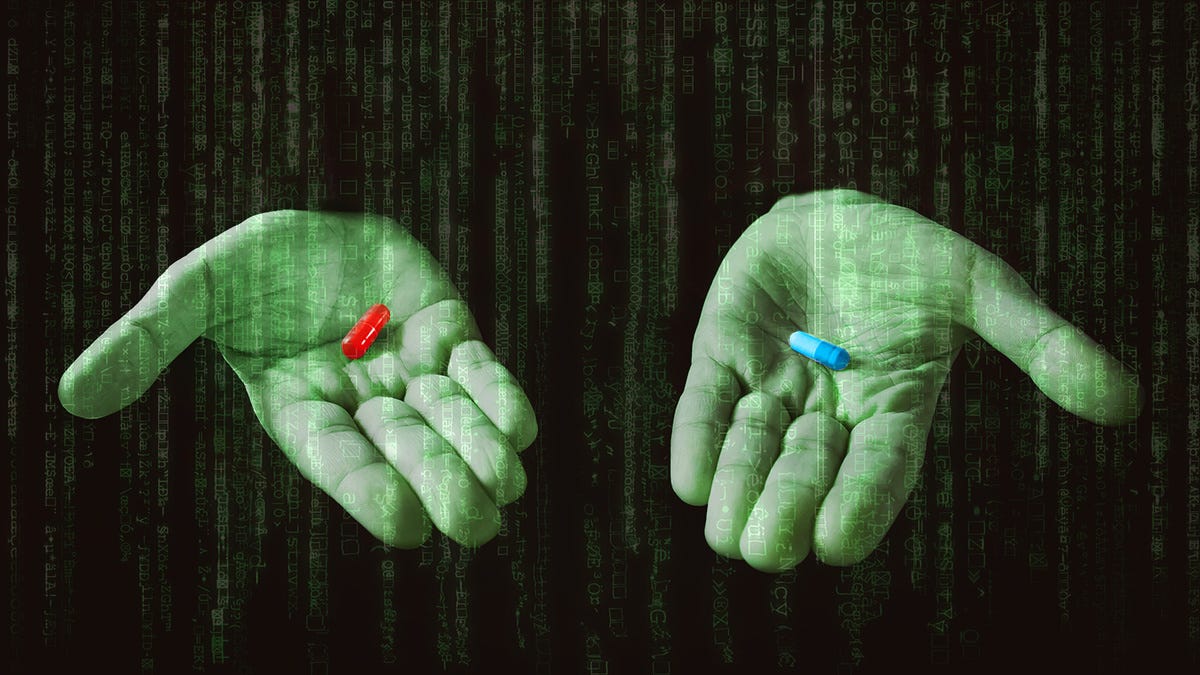

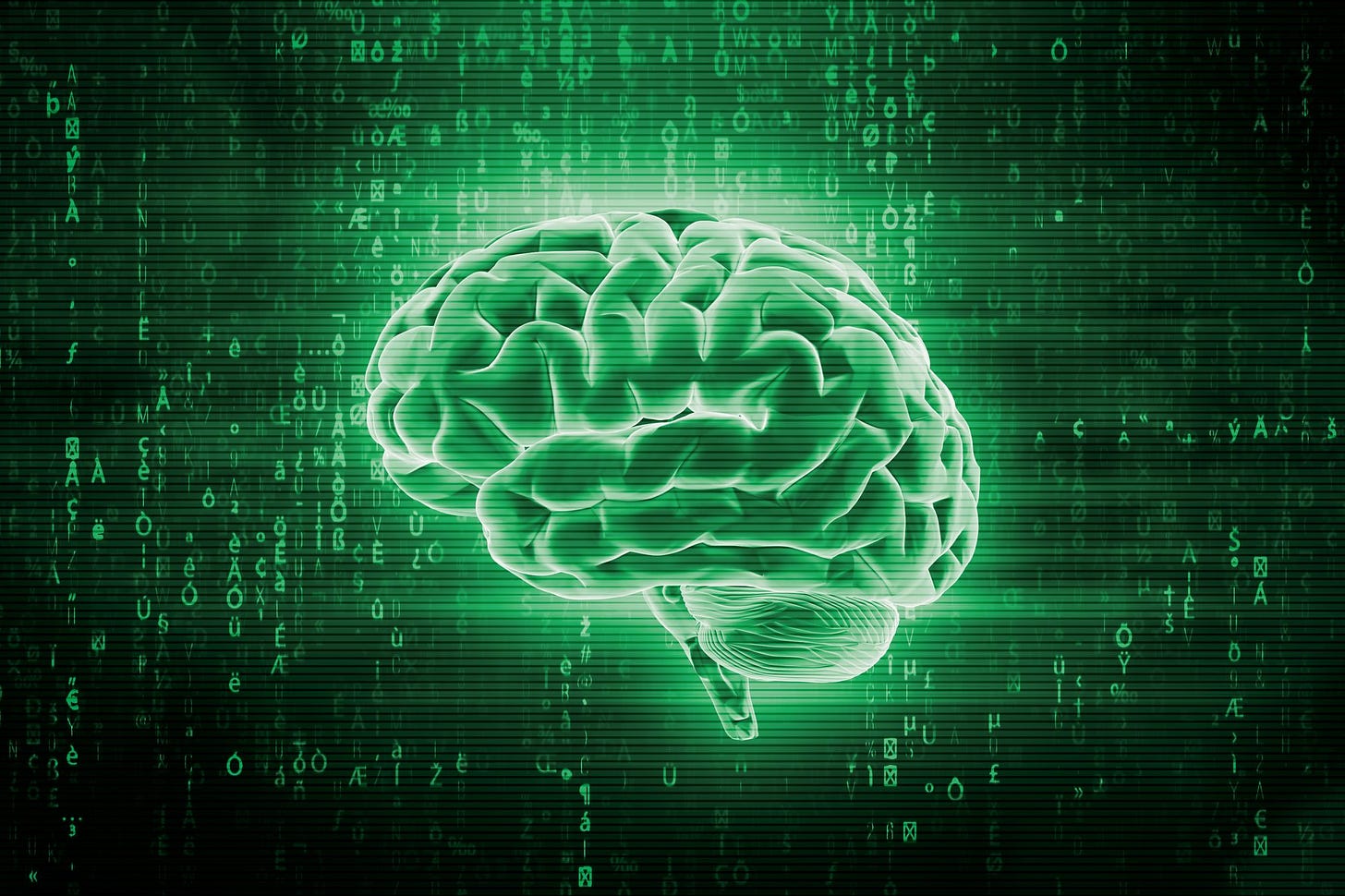
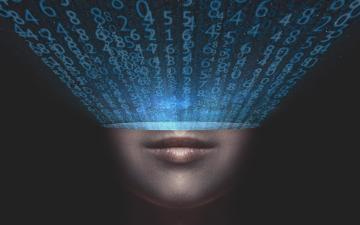

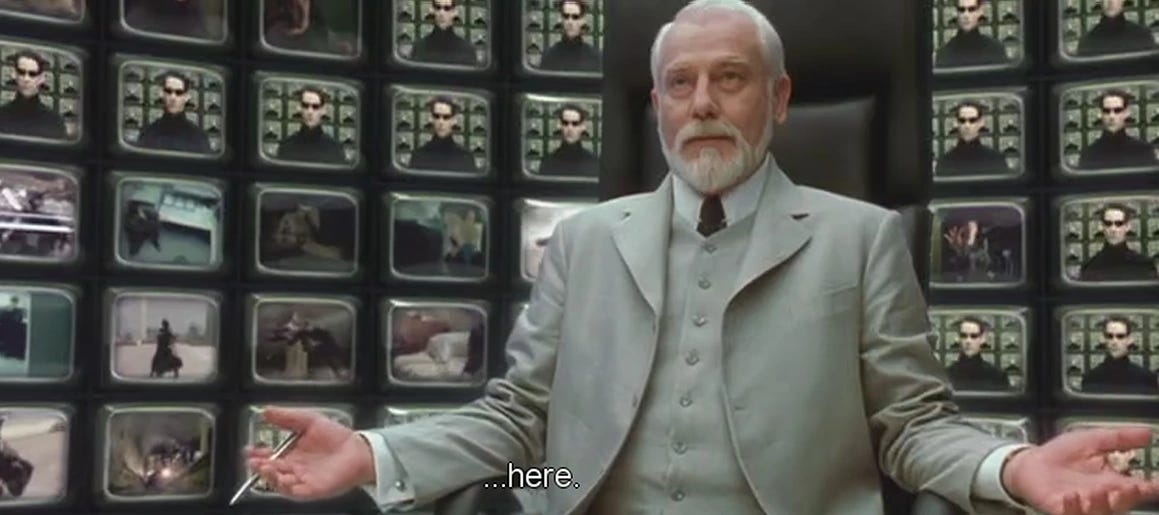
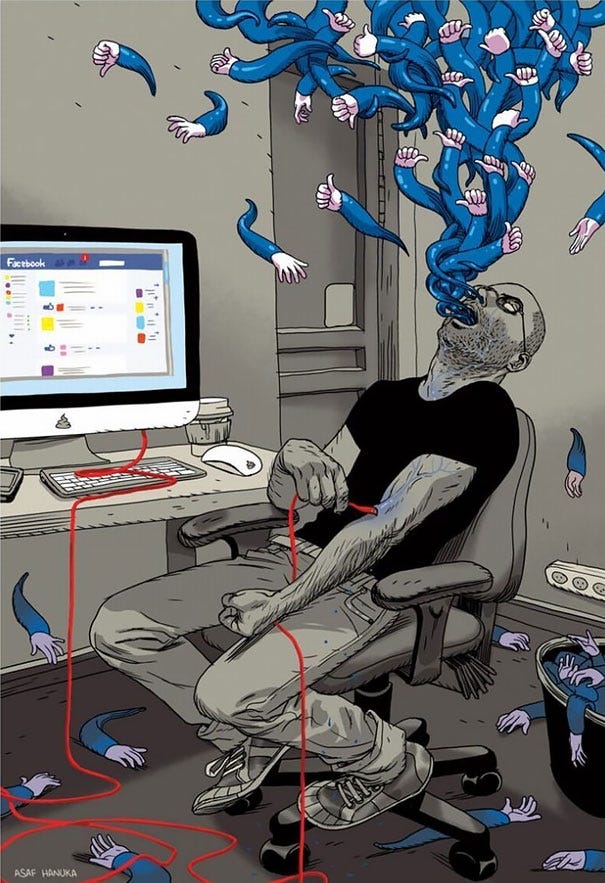
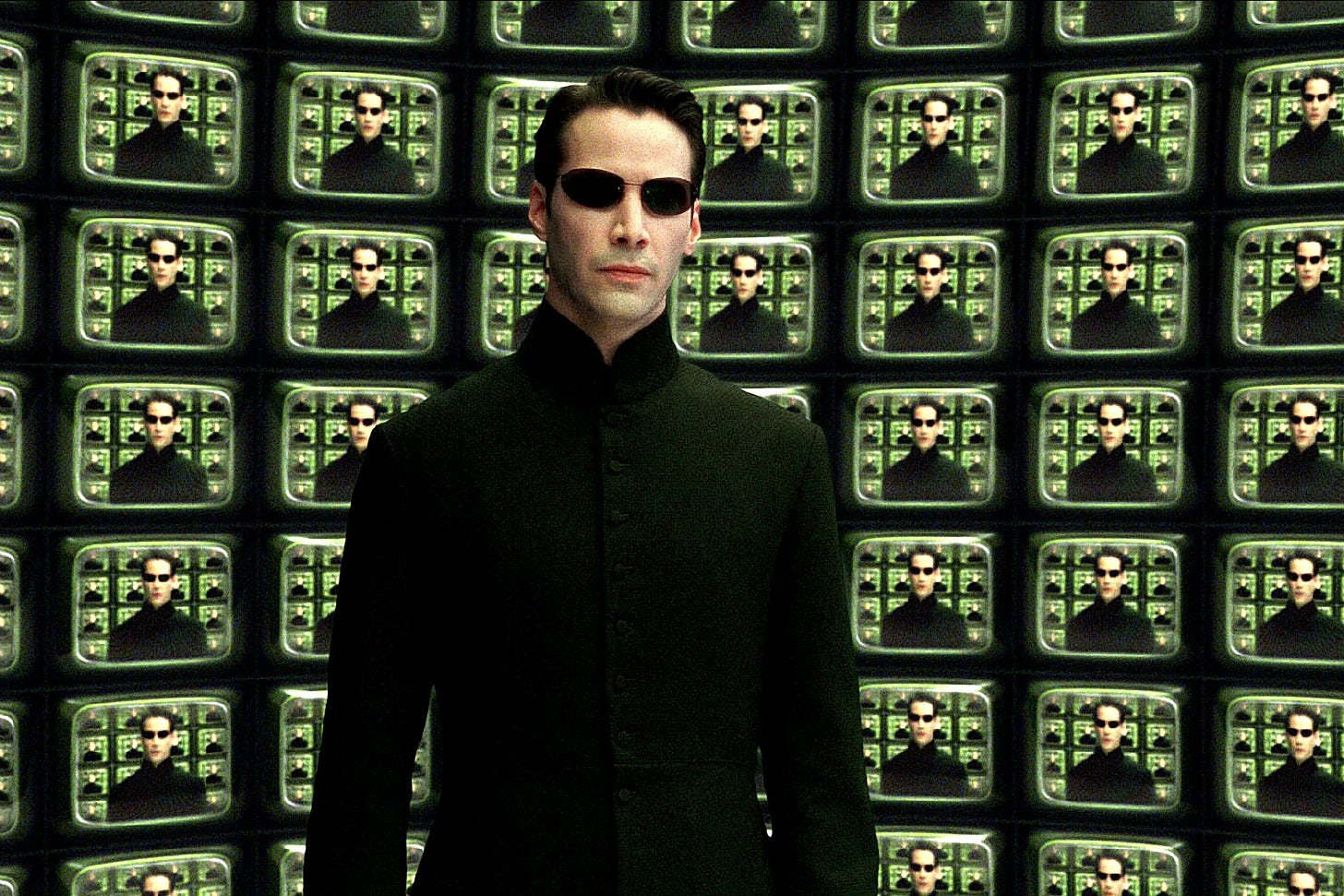
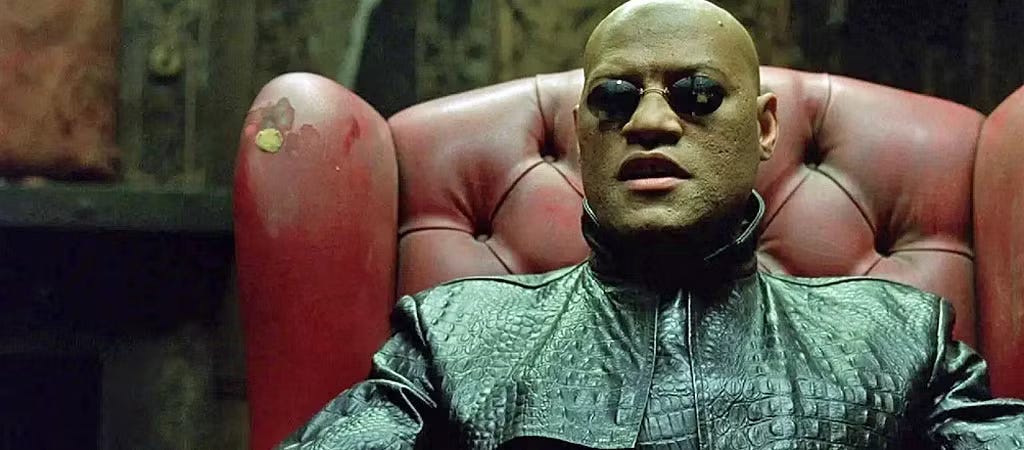
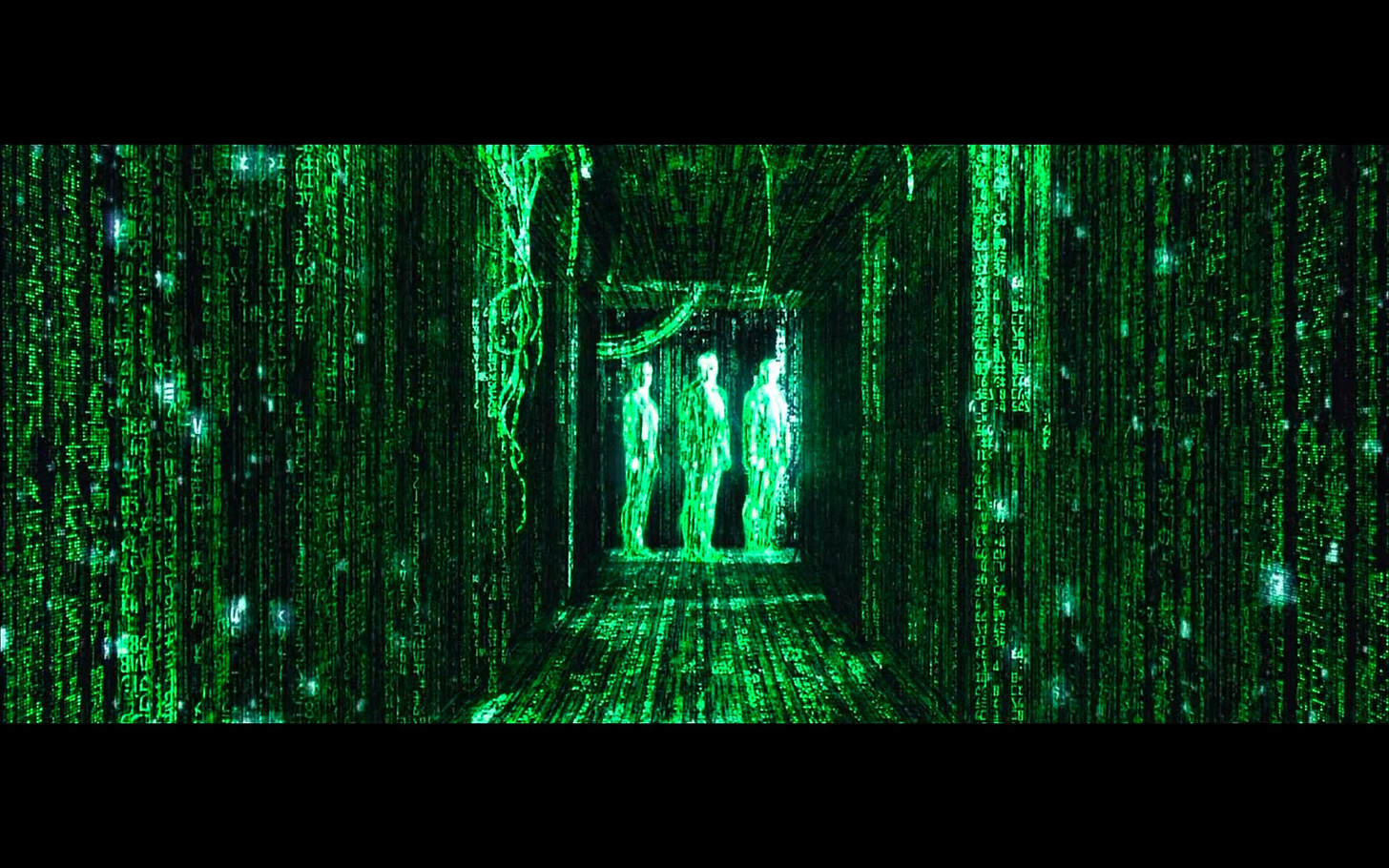
“to participate in reality’s unfolding rather than unconsciously consuming its representation “
Wow this is fantastic!! To directly experience life and living.
Homeschooling is my background so I ponder learning a lot.
Freedom is my passion so I notice the world of control!
One thought: if children are forced to study books and memorize bugs and plants, they often learn to hate nature because they are forced to remember.
Instead we went outside and noticed our world and experienced it directly. Then you discover reality. I cherished my many years with my 7 kids!
Another excellent article, and one that hits sorely close to home, as it's a pattern most "alternative" thinkers fall into.
We question the official narrative. We fall into the "alternative," a lot of which is nonsense. After grasping at straws, we grab onto a narrative construct to help us categorize the alternative. I was an "anarcho-capitalist" for a long time because it was a comfortable and pre-packaged worldview to help me (overly) simplify complex information streams.
But that, too, fell under its own weight eventually. Too too much incongruousness. Your LUCID method is very similar to Gene Odening's Trivium Method:
https://www.triviumeducation.com/
Both are invaluable tools for taking back your autonomy. As I'm sure others have noticed, we no longer argue with "normies," but the ostensible "alternative" crowd who've yet to realize they're already the forefront of the new Information Matrix.